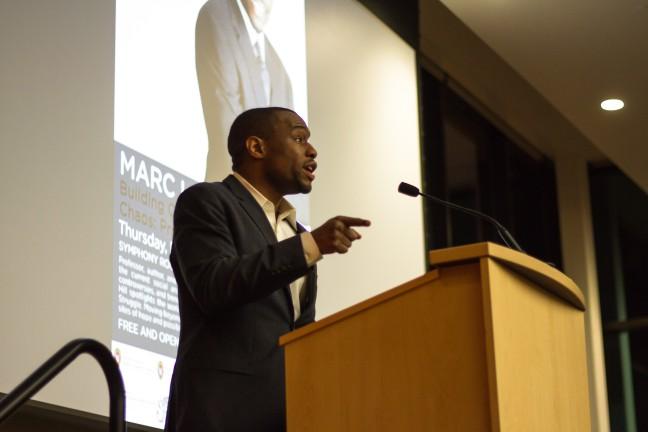In an era of constant talk, the need for listening and understanding in community building is more critical than ever before, according to Thursday night’s Distinguished Lecture Series speaker.
Dr. Marc Lamont Hill, a professor, author, cultural critic and the guest DLS speaker at the University of Wisconsin, spoke on how black history can be understood in the age of Obama.
“One of our own became the leader of the most powerful empire in history,” Hill said. “The idea that he can become president suggests that we may have matured this project. It suggests that we live in a country that doesn’t just grow old but grows up.”
Hill explained Obama’s election as a marker of a collective capacity for progress. Yet Hill said he demands more, that people need to continue to reimagine and demand more from Obama’s era.
Although America is the richest nation, Hill said there is still poverty and people are going to bed hungry. America is obsessed with mass incarceration and building up jails as a priority over schools, he said.
“Black success and black poverty causes a mass expansion of a middle class and an extraordinary gap between the have nots and the have gots,” Hill said.
There is something to learn from the tradition of Black History Month to correct such problems, Hill said. This is the idea Hill coins as deep listening, something people in this day and age find difficult to navigate.
In an age of constant talk, everyone is articulating their own voice yet are lacking real conversations and understanding of what the other is saying, Hill said.
“As a result of all of this talk and all of this obsession with the self, we have compromised our ability to hear other people,” Hill said. “Deep listening is a humanizing project. It allows me to see the humanity in you.”
All voices need to be heard and understood to come to a collective understanding, he said.
By hearing and connecting struggles, one can use such connections to build coalitions for progress, Hill said. But, he said it isn’t necessary to agree on every topic, but to connect and unite on a common front to make a difference.
History causes people to believe that threats come in certain, stereotypical packages, which allow us in the current day to overlook injustices and justify them, Hill said.
To fix the issues plaguing society today, Hill argued we must look at history to understand, without simplifying it. By simplifying issues and questions, one only promotes inequality, Hill said.
“Simple answers to complex questions reproduce inequality [and] reproduce injustice,” Hill said. “They allow us to point blame at folks that don’t deserve it.”
In order to face this history and inequality and to make a change, people must face the world with bravery, Hill said.
Hill ended on the notion that change isn’t about an individual hero but all the people that back them up. To make a difference, one must back something that is larger than them and that will last longer than they will, Hill said.
“The first thing you have to do is act,” Hill said. “The biggest problem in the world today is that there are too many people who don’t do anything. To act bravely is to commit yourself to a cause.”














